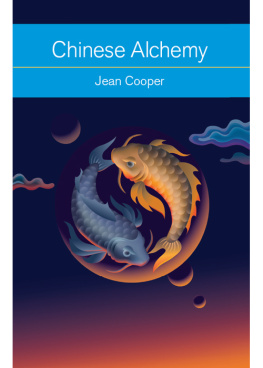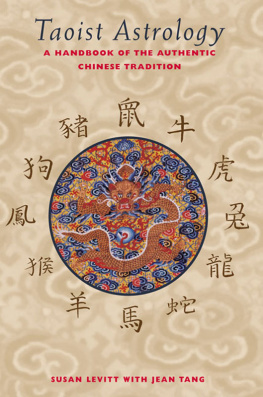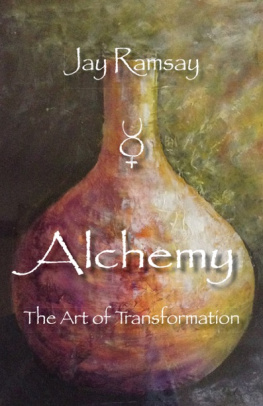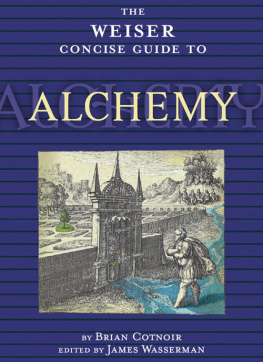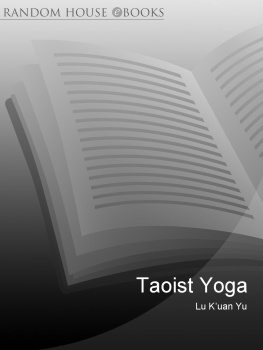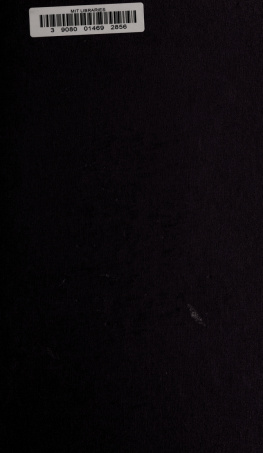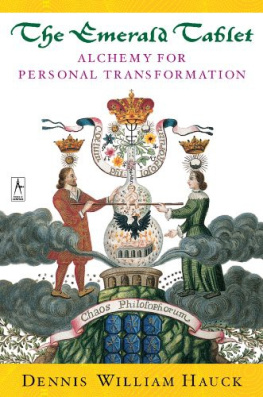
This edition first published in 2016 by Weiser Books
an imprint of Red Wheel/Weiser, LLC
With offices at:
65 Parker Street, Suite 7
Newburyport, MA 01950
www.redwheelweiser.com
Copyright 2016 by J. C. Cooper
All rights reserved. No part of this publication may be reproduced or transmitted in any form or by any means, electronic or mechanical, including photocopying, recording, or by any information storage and retrieval system, without permission in writing from Red Wheel/Weiser, LLC. Reviewers may quote brief passages. Originally published in 1984 by Aquarian Press, a part of the Thorsons Publishing Group, ISBN: 1-85030-327-3.
ISBN: 978-1-57863-577-1
Library of Congress Cataloging-in-Publication Data
Names: Cooper, J. C. (Jean C.) author.
Title: Chinese alchemy : Taoism, the power of gold, and the quest for immortality / J.C. Cooper.
Description: San Francisco : Weiser Books, 2016. | Includes bibliographical references and index.
Identifiers: LCCN 2015042587 | ISBN 9781578635771 (5 7.75 pbk. : alk. paper)
Subjects: LCSH: Taoism--China. | Alchemy.
Classification: LCC BL1923 .C66 2016 | DDC 299.5/14--dc23
LC record available at http://lccn.loc.gov/2015042587
Cover design by Graham Lester
Text design by Jane Hagaman
Printed in the United States of America
M&G
10 9 8 7 6 5 4 3 2 1
www.redwheelweiser.com
www.redwheelweiser.com/newsletter
CONTENTS
ACKNOWLEDGMENTS
I am greatly indebted to Professor Needham for permission to quote, and use illustrations, from his monumental work Science and Civilization in China. My thanks also to Mr. W. Greenhalgh for reproducing photographs from old slides taken in China.
In memoriam
Francis Clive-Ross
1
ORIGINS
There is little in Chinese alchemy that cannot be associated with Taoism and although the exact origins of that alchemy may still be in dispute in the light of present incomplete evidence, it is not questioned that it grew and was nourished in the soil of popular and religious Taoism. It is also recognized that there are two distinct branches of Taoism: the classical Tao Chia, the mystical, metaphysical aspect, stemming from Lao Tzu and Chuang Tzu, and the popular, religious, magical, alchemical side, the Tao Chiao, which arose traditionally with the Yellow Emperor and his Three Immortal Ladies, or Maids, who taught him magic, mysticism and love. Lao Tzu and Chuang Tzu probably represented a movement against these earlier animistic-magico practices and founded the Tao Chia as a protest, or rather a correction, at a time when such practices had lost their original meaning and become loaded with superstition.
Yet another viewpoint is that classical Taoism was original but was too austere and rarefied for the general populace and later, meeting the shamanism which flourished in the tribes of the regions north and west of China proper, absorbed shamanistic-animistic lore and degenerated into the religious, ritualistic, magical and alchemical branch, the Tao Chiao, which fulfilled the day-to-day needs of the people and which still exists in modern times as a popular religion. Thus, from being abstract philosophy, it became a concrete religion with a ceremonial Church, having a priesthood, liturgy and theology, a Pope, and a Trinity known as the Three Pure Ones. From the original non-theistic mysticism it became not only theistic but polytheistic, adopting the pantheon of popular Buddhism.
While the origins and dates of Chinese alchemy are still being researched and debated (there are literally hundreds of Taoists texts as yet untranslated) it is known for certain that it flourished well before 144 BC, for at that date the Emperor issued an edict which ordered public execution for anyone found making counterfeit gold. The making of counterfeit cash was also proscribed. However, in the year 60 BC the then Emperor appointed a well-known scholar, Liu Hsiang, as Master of the Recipes so that he could make alchemical gold and prolong the Emperor's life. He failed to make the gold and so was disgraced. This points to an already well-established and widespread practice in alchemy. It was also said to have been practised in the fourth century BC by Tsou Yen, who had a reputation as a miracle-worker and a following among the aristocracy. He was also reputed to have been the first alchemist to combine the search for the Elixir with the search for gold.
The Later Han dynasty (AD 25-220) was a time of great interest in science, astronomy, botany, zoology and medicine and in this period there appeared the first book on alchemy, the Ts'an T'ung Ch'i of Wei Po-yang. Its date was about AD 142 and its title is translated as The Book of the Kinship of the Three, but it was written in terms which were too difficult for the understanding of all but initiates. But most of the alchemical texts derive from the T'ang dynasty (AD 618-960), which maintained this interest, especially in the alchemical branch of Taoism.
The language of the Ts'an T'ung Ch'i being too complicated and esoteric to be of general use, it is to Ko Hung that we must turn for the earliest complete treatise. He lived about AD 260 to 340 and is regarded as the most famous of writers on Chinese alchemy. He is supposed to have written several hundred books but his known work is the Pao P'u Tzu nei p'ien, usually referred to as the Pao P'u Tzu, though this was, in fact, a pseudonym he adopted and can be translated as The Master who preserves his pristine simplicity, which has also been rendered as Old Sobersides. The work is in two parts, the nei p'ien, comprising some twenty scrolls, and the wei p'ien, some fifty. He says: My nei p'ien, telling of gods, genii, prescriptions and medicines, ghosts and marvels, transformations, maintenance of life, extension of years, exorcising evils and banishing misfortune, belongs to the Taoist school. My wei p'ien, giving an account of success and failure in human affairs and of good and evil in public affairs, belongs to the Confucian school.
It was Ko Hung who was responsible for the delightful definitions of classical Taoism and Confucianism. He was asked: Of Confucianism and Taoism, which is the more difficult? He replied: Confucianism is difficulty in the midst of facility; Taoism is facility in the midst of difficulties; in it all annoyances are lifted with an inner harmony that grows of itself; perfect freedom of action and thought; no fear, no grief. Taoists reject specialization in worldly matters, wash away all trickeries, forget wealth and neglect honours, block repression and encourage free expression, are not concerned about the loss of anything, do not glory in success and are not saddened by denigration and take no delight in praise.
Ko Hung regarded the existing scrolls for medicines as incomplete, confused and often lacking in treatment for many critical illnesses. He said that they employed expensive ingredients only available to the rich, whereas his scrolls would be found to mention all the medicines and give full treatment for all serious illnesses: Any household possessing this book can dispense with the services of a physician. Further, it is not always possible to find a physician at a moment's notice and when you do find one he may not wish to come immediately. (This strangely modern passage was written nearly 2000 years ago!)
Chinese alchemy, being more concerned with longevity and immortality than with the making of gold, was naturally involved with finding the Elixir of Immortality and with prescriptions for prolonging life. When challenged that he was attempting the impossible in trying to overcome mortality in this life, Ko Hung replied that although the deaf could not hear thunder or appreciate music, and the sun and the splendour of the Emperor's robes were invisible to the blind, it did not mean that these things did not exist. His recipe for long life was the use of appropriate medicines, breathing exercises and philosophical thought. Alchemy, like all esoteric lore, had to be learned from an adept and Ko Hung's master, Cheng Yin, at over eighty, had black hair, a full cheerful face and could draw a strong cross-bow and shoot a hundred paces; he walked hundreds of miles and could drink two demijohns of wine without becoming drunk; he climbed mountains with agility and crossed precipitous places and dangerous heights which daunted younger men. He ate and drank the same things as anyone else, but could go for unlimited days without food and without feeling hunger.
Next page
